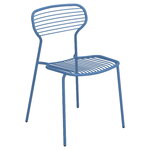EMU's Apero chair is a minimalist patio chair designed by Martin Drechsel. Its silhouette is characterised by airy lightness and a captivating dialogue between straight and curved lines. The steel frame and its industrial references make the Apero chair a functional, durable, low-maintenance option for any outdoor seating area, and the chair's graphic, simplistic design pairs equally well with other steel furniture as well as with wooden patio furniture, for instance. Apero chairs are lightweight and stackable, making them easy to store without taking up much space.


Apero chair, marine blue
Emu
Description
EMU's Apero chair is a minimalist patio chair designed by Martin Drechsel. Its silhouette is characterised by airy lightness and a captivating dialogue between straight and curved lines. The steel frame and its industrial references make the Apero chair a functional, durable, low-maintenance option for any outdoor seating area, and the chair's graphic, simplistic design pairs equally well with other steel furniture as well as with wooden patio furniture, for instance. Apero chairs are lightweight and stackable, making them easy to store without taking up much space.
Product details (10)
- Colour
- Blue
- Width
- 50 cm
- Depth
- 52 cm
- Height
- 78 cm
- Seat height
- 45 cm
- Material
- Steel
- Maximum load capacity
- 200 kg
- Weight
- 5.4 kg
- Stackable
- Yes, 6 pcs
- Care instructions
- Before the winter and on a quarterly basis, if the products are kept near the sea, it is recommended to clean the metal surfaces with a soft cloth using water or detergent and protect them with Vaseline oil or car wax. We recommend storing it indoors and in a dry place during the winter.
- Product ID
Designer
Martin Drechsel is a German-Swiss industrial designer whose work is guided by an interdisciplinary and global mindset. Having studied arts, technology and business, Drechsel has worked with industrial design consulting and furniture design across Europe, from Berlin to London and from Milan to Amsterdam. Growing up in an engineering family in East Germany, Drechsel's works reflect a special appreciation for practical inventiveness, reliable quality and long-lasting products.
View all productsReviews (0)
Sustainability
The Product Sustainability Framework, our criteria of sustainable design, helps you find the most sustainable products in our selection. Read below which sustainability criteria this product has met.
Working conditions & labour 7/9
-
Equal opportunities for all employees
-
Commitment to UN Global Compact, fair compensation for all employees
-
Corporate responsibility requirements defined and communicated for suppliers
-
Systematic work for improved inclusion and well-being in the workplace
-
Transparent supply chain
-
Compliance to the UN Guiding Principles on Business and Human Rights ensured in the supply chain
-
Support for community involvement in the supply chain
-
Suppliers' compliance to a code of conduct ensured
-
Direct suppliers audited and certified
Eco-friendly production 7/9
-
Fair and resource-wise water-use in production
-
No incineration or landfilling of returned items
-
No use of endangered species as materials
-
No direct environmental emissions or waste (excl. GHGs) from production
-
Production and material sourcing that respect biodiversity, animal rights, and natural ecosystems
-
Material-efficient and ecological packaging
-
No potentially harmful chemicals used in own production
-
The sustainability of direct suppliers' production is addressed and monitored
-
Positive impact on nature’s well-being through operations that regenerate natural ecosystems
Climate impact 6/8
-
Company's direct greenhouse gas emissions identified and commitment to reduction
-
Product's carbon impact identified and commitment to reduction
-
Guidance on energy- and eco-efficient use of the product
-
Contribution to climate initiatives beyond the brand’s direct operations
-
Carbon footprint of the product calculated and goals set to reduce it
-
Carbon neutral or carbon negative product
-
Low-carbon or compensated transportation
-
100 % renewable energy in own production and operations
Sustainable materials 6/6
-
Sustainable and long-lasting material choices
-
No harmful or hazardous substances
-
Responsible raw material sourcing and production
-
Materials suited for circularity: monomaterials, recyclable finishings, renewable or recycled contents etc.
-
Ecological materials: natural, biodegradable, recyclable or recycled contents
-
Outstanding materials in terms of innovativeness, responsibility, sustainability and circularity: local production or sourcing, 100 % recycled content, C2C-certification etc.
Circular design 5/5
-
High aesthetic quality promoting long-term use of the product
-
Technically durable product design and material choices
-
Design for enduring life-long quality
-
Design and support for product maintenance, repair and upgradability
-
Innovative circular design solutions: circular service system, resale platform, remanufacturing, collection of used products, etc.




